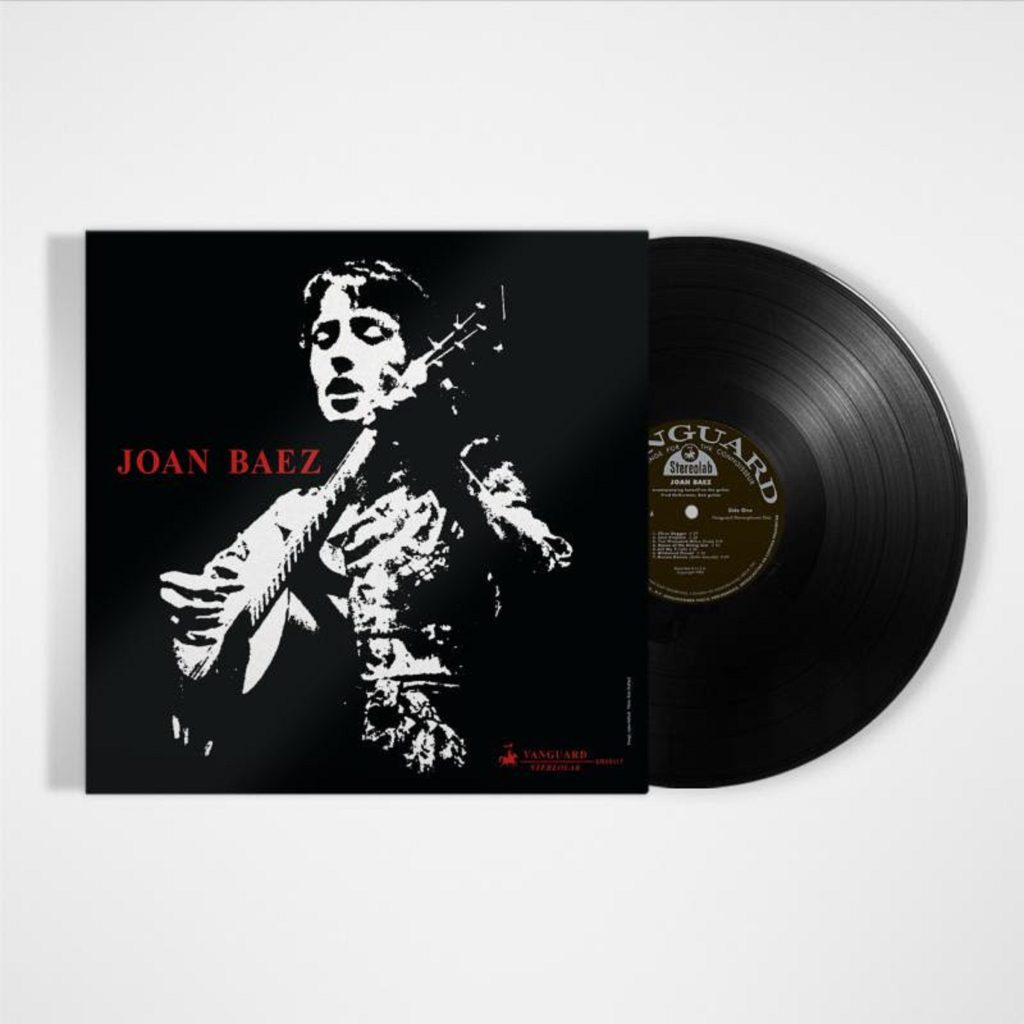Article Contributed by Gary Gorczyca
Published on January 18, 2019

Joan Baez is one of the most prominent and iconic singer-songwriters to ever grace the stage. Her career arc, which was forged in the crucible of the early 60’s folk revival, spans six decades. She has released over 30 albums, most of them to critical acclaim. In 2017 she was elected into the Rock and Roll Hall of Fame.
This past October of 2018, Joan Baez’s self-titled first album was re-released in its original analog format on vinyl and for digital download by Craft Recordings. It was also released in an exclusive red vinyl format limited to 750 copies (available at Barnes & Noble).
In 2011, the National Academy of Recording Arts & Sciences inducted this album into the Grammy Hall of Fame.
This album is also considered one of the most culturally significant and important American popular albums of the 20th century. So much so that in 2015, the Library of Congress selected it for special recognition and preservation for its “cultural, artistic and/or historical significance to American society and the nation’s audio legacy”. Pretty heavy stuff.
As someone who is old enough to vaguely remember Ms. Baez as a prominent figure in the 60s protest scene and as a performer at Woodstock, I wasn’t really familiar with her history as a pioneer of the 60s folk revival or of the prominence of her voluminous discography.
Thus it was my pleasure to listen to this album and all of its songs for the very first time with no preconceived notions.
If you’re interested in musical history (as I am) this album is an ethnographer’s dream. Recorded at the Manhattan Towers Hotel Ballroom in New York City over the course of four nights during the summer of 1960 when Joan was just 19 years old, its 13 traditional folk songs are plucked from the zeitgeist of various cultural musical traditions including English, Irish, Scottish, Yiddish, Mexican and Americana. The album was originally released on the independent record label, Vanguard Records
It’s a simple album that was recorded using only two microphones to capture Joan’s soaring soprano and falsetto along with the melodic accompaniment of her guitar. Some tracks have a second acoustic guitar played by Fred Hellerman of The Weavers.
The crisp 46-minute-long recording is also an easy, pleasurable listen for any folk music fan with each of the songs having a story to tell.
If you like traditional folk music and/or are fan of Joan Baez, I recommend adding this to your collection.
Some of my favorites off this album are:
“East Virginia” which sounds very much like one of my favorite traditional songs: “Poor Wayfaring Stranger” and has lyrics very similar to the Bill Browning standard, Dark Hollow;
“House of the Rising Sun” which had previously been performed by Woody Guthrie in 1941 and Lead Belly in 1944 and was later made famous by Eric Burdon and The Animals in 1964;
“Donna Donna” A traditional Yiddish folk song;
“John Riley” a 17th century English ballad derived from Homer’s Odyssey;
“Henry Martin” a traditional Scottish folk song;
And “El Preso Número Nueve” which translates to “Prisoner Number 9”. Joan sings this song beautifully in Spanish accompanied with flamingo style guitar.
Track listing Side 1:
1. “Silver Dagger” 2:30
2. “East Virginia” 3:38
3. “Fare Thee Well” 3:15
4. “House of the Rising Sun” 2:52
5. “All My Trials” 4:36
6. “Wildwood Flower” 2:30
7. “Donna Donna” 3:09
Track listing Side 2:
8. “John Riley” 3:50
9. “Rake and Rambling Boy” 1:50
10. “Little Moses” 3:25
11. “Mary Hamilton” 5:54
12. “Henry Martin” 4:10
13. “El Preso Número Nueve” (Prisoner Number 9) 2:47